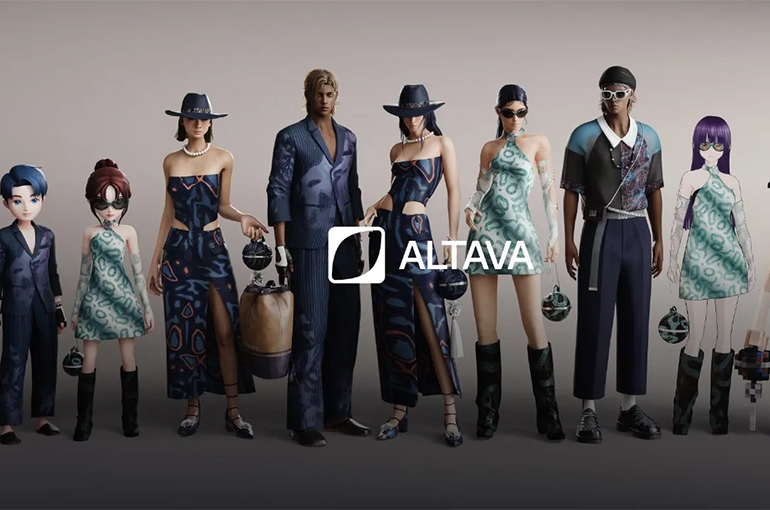 AI Fashion-Tech Firm Altava Seeks China Partners, Co-Founder Says
AI Fashion-Tech Firm Altava Seeks China Partners, Co-Founder Says(Yicai) Aug. 6 -- Altava Group, a pioneering vertical artificial intelligence fashion-tech company, is looking for partners in China to collaborate on a range of projects, co-founder and Chief Executive Officer Andy Ku said.
“We are actively seeking suitable partners in China who can collaborate with us on various projects,” Ku told Yicai in a recent interview. “We are open to forming a joint venture or any other partnership model that allows us to establish a strong local presence in China through our partnerships.
“We are already engaging with game companies, but our recent inquiries have primarily come from virtual influencer companies in the entertainment industry,” noted Ku, a two-decade veteran of the gaming industry. “So it could be a game company or an AI company, or even a marketing-related company.”

Ku was scheduled to meet with an AI firm on the same day that Yicai interviewed him, and he noted that there was a possibility of partnering with a game company as well.
“We are prepared and wish to make a significant contribution in China” with the firm’s AI-powered fashion solutions, Ku said. “We are eager for it to happen, but it has not been an easy journey due to the challenges posed by Covid-19.”
Ku was in Shanghai at the end of last month to attend China Joy, one of the largest gaming and digital entertainment expos in the world. Altava was at the event for the first time. The Singapore-based company showcased its massive fashion catalog library, which contains high-quality designs in 3D asset format, as well as introduced a new person-to-business service to provide 3D assets to video game companies worldwide.
China has emerged as a global leader in the gaming industry, both in terms of the number of game companies, developers, and the quality of games, Ku said.
“We value working closely with Chinese game developers and recognize the importance of having strong partnerships in China,” he said. “However, when it comes to virtual and digital fashion, we currently hold the number one position worldwide.”
The traditional process of creating virtual fashion for game avatars is labor-intensive as well as lengthy and expensive, Ku pointed out. Altava's AI-powered technology enables the “automatic conversion of assets into 3D models that fit seamlessly into an avatar system with just one click.”
The service slashes the development costs for game companies by as much as half, while maintaining high-quality fashion assets, he said.
“It's important to have a partner who understands the product and service we are offering,” he said. “I have established strong connections with several game companies, which could potentially become our partners.”
Bringing Luxury Fashion to the Virtual World
Ku has long recognized the potential of AI and virtual fashion, though entering the luxury fashion domain was not easy. With previous experience of selling fashion as game skins, Ku was inspired to incorporate luxury fashion from recognized brands into games. He pursued partnerships with luxury brands between 2012 and 2014, but made no progress.
“It was not until 2019 that I met [Altava] co-founder Elizabeth, who is French and has access to the right people in luxury fashion,” he recounted. Elizabeth von Guttman has connections with the CEOs and creative directors at various luxury brands, as they operate in a closed community, Ku noted. “Without being part of that inner circle, it is nearly impossible to get anything done with these individuals.”
The Covid-19 pandemic played a pivotal role in breaking the inner circle of luxury brands, as in-person fashion shows were canceled, and brands were forced to shift to digital platforms. Lacking expertise in 3D tech and in-house capabilities, “they reached out to us, seeking assistance in creating virtual fashion shows, showrooms and pop-up stores,” Ku said. That is when Altava set up its P2B business.
According to Ku, this collaboration also benefits both gamers and video game companies, as it enhances revenue opportunities and provides a unique and appealing experience for players.
Altava works with top 40 luxury brands, including Prada, Fendi, Balmain, Bvlgari, and LVMH, offering services such as building virtual ambassadors, creating virtual pop-up stores, exhibitions, showrooms, and non-fungible tokens. The company, set up in 2018, is also working on several projects including well-known brands into specific games.
“Brands are increasingly recognizing these virtual worlds platforms as the next and newest channel to engage with consumers,” Ku pointed out.
“The evolution began with offline-only operations, followed by the emergence of e-commerce as a secondary channel, and now includes the virtual world, including gaming,” he said. “It is evident that the virtual world represents the latest channel that all brands must ultimately conquer.”
According to Ku, Altava’s AI-powered virtual fashion solutions have the potential to significantly influence consumer behavior, particularly among the younger generation, who are likely to have stronger affinities for those brands in the physical realm through their virtual experiences in gaming and the metaverse.
“From a brand perspective, this provides a valuable marketing opportunity and allows for the sale of virtual fashion, which represents a cutting-edge business model,” he said.
The virtual fashion sector is already worth about USD4 trillion and is expected to grow by 20 to 30 times in the coming years. The next big opportunity in fashion lies not in traditional retail, but in the virtual world, which Altava's AI tech is well-positioned to capitalize on, Ku said.
Ahead of the Curve
Based in Singapore with a team of about 60 in Seoul, South Korea, Altava is developing its own AI tools and has not turned to ready-to-hand large language models such as OpenAI’s ChatGPT.
The tool enables users to automatically generates 3D assets based on prompts without the need for design skills, and it ensures compatibility with the diverse avatar systems across various virtual worlds, including TikTok, Snapchat, VRChat, Apple ProVision, and so forth. So far Altava has opened up the Roblox conversion tool, allowing anyone to create Roblox avatar-ready fashions, Ku said.
As Altava forges partnerships with more virtual world providers and gains access to their avatar systems, the AI tool continues to evolve and refine its capabilities, he added. This dynamic approach ensures that the assets generated remain versatile and adaptable, keeping pace with the rapidly changing landscape of the metaverse.
When asked about the tool's training data, Ku highlighted a unique advantage. “Even though 3D assets are available, there are not enough of them to support comprehensive training,” he said. “This presents a significant challenge for us, but it also gives us an edge over others.
“For competitors to replicate our approach, they would require a vast library of 3D fashion assets, which is an immense undertaking -- one that involves obtaining even 1,000 such assets, let alone billions,” he pointed out.
“We are not trend followers, but we are fortunate enough to always be ahead of the curve and be among the early adopters of future trends, arriving at the right time and place,” Ku concluded.
Editor: Tom Litting